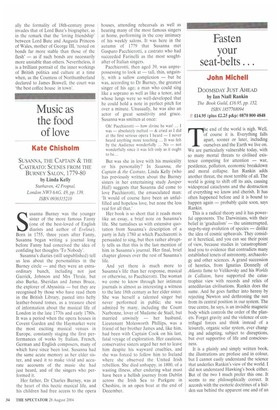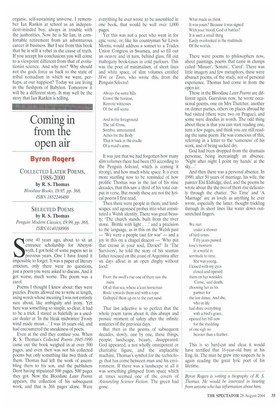Fasten your seat-belts . . .
John Michell
DOOMSDAY JUST AHEAD by Ian Niall Rankin The Book Guild, ┬Ż16.95, pp. 152, ISBN 1857768094 r ┬Ż14.95 (plus ┬Ż2.25 p&p) 0870 800 4848 The end of the world is nigh. Well, of course it is. Everything falls apart, sooner or later, including ourselves and the Earth we live on. We are particularly vulnerable today, with so many mortal threats to civilised existence competing for attention ŌĆö war, pestilence, pollution, economic breakdown and moral collapse. Ian Rankin adds another threat, the most terrible of all. The world is going to shift off its axis, causing widespread cataclysms and the destruction of everything we know and cherish. It has often happened before and it is bound to happen again ŌĆö probably quite soon, says Rankin.
This is a radical theory and it has powerful opponents. The Darwinians, with their belief in 'gradualism' ŌĆö the uninterrupted, step-by-step evolution of species ŌĆö dislike the idea of cosmic upheavals. They consider it heretical, and you can see their point of view, because studies in 'catastrophism' lead you to evidence that contradicts many established tenets of astronomy, archaeology and other sciences. A grand succession of heretics, from Ignatius Donnelly of Atlantis fame to Velikovsky and his Worlds in Collision, have supported the catastrophist view with records and relics of antediluvian civilisations. Rankin does the same. And he goes further into heresy by rejecting Newton and dethroning the sun from its central position in our system. The true centre, he says, is an invisible magnetic body which controls the order of the planets. Forget gravity and the violence of centrifugal forces and think instead of a leisurely, organic solar system, ever changing and adapting, subject to disruptions, but ever supportive of life and consciousness.
It is a plainly and simply written book, the illustrations are profuse and in colour, but I cannot easily understand the science that underlies Rankin's view of the world. I did not understand Hawking's book either. But of the two I much prefer this one. It seems to me philosophically correct. It accords with the esoteric doctrines of a hidden sun behind the apparent one and of an
organic. self-sustaining universe. I remember Ian Rankin at school as an independent-minded boy, always in trouble with the authorities, Now he is Sir Ian, in comfortable retirement from an adventurous career in business. But I see from this book that he is still a rebel in the cause of truth. If you accept his conclusions you will come to a viewpoint different from that of evolutionist science. And why not? Why should not the gods force us back to the state of tribal nomadism in which we were, perhaps, at our happiest? Today we are living in the fleshpots of Babylon. Tomorrow it will be a different story. It may well be the story that Ian Rankin is telling.



























































 Previous page
Previous page